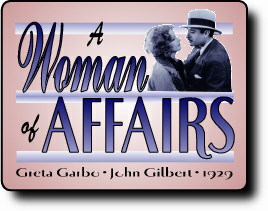

MGM
Cast: Greta Garbo (Diana Merrick), John Gilbert (Neville Holderness), Douglas Fairbanks, Jr. (Jeffry Merrick), John mack Brown (David Furness), Lewis Stone (Dr. Hugh Trevelyan), Hobart Bosworth (Sir Morton Holderness) Dorothy Sebastian (Constance)
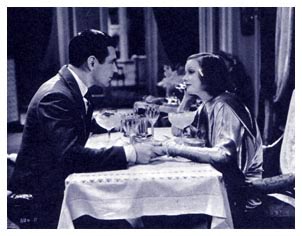
Diana Merrick is a young British aristocrat in love with Neville Holderness . Their plans to marry are sabotaged by Neville's father, Sir Morton Holderness, who strongly disapproves of the reckless life of Diana and her alcoholic brother, Jeffry. The old man sends Neville to Egypt -- and away from Diana. After several years, Diana marries Jeffry's hero and role model, David Furness (Johnny Mack Brown), only to watch in horror as David is arrested for kleptomania and kills himself on their wedding night. To protect Jeffrey's memory of his hero, Diana spends the next seven years orchestrating a series of affairs with wealthy men to repay the victims of her dead groom.
Meanwhile, Neville has married Constance. Diana falls gravely ill, and Dr. Hugh Trevelyan, her friend and protector, summons Neville to her side. When Diana recovers, Neville plans to leave Constance and move with Diana to South America. But Diana, knowing her love will ruin Neville, sends him back to Constance and kills herself by driving her car into the very tree under which she and Neville first declared their love.
Well, the plot is absurd. But when was the last time you watched a Garbo film for the plot? So, suspending any disbelief, let's consider the compensations of A Woman of Affairs, and they are many.
MGM wasn't about to take chances in directly adapting the
controversial Michael Arlen novel (and play) The Green Hat
for the screen. The story of a promiscuous society woman whose
husband commits suicide rather than infect her with venereal 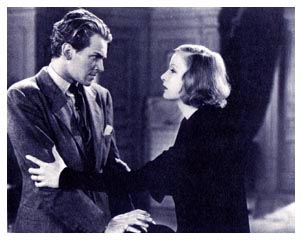 disease had already incurred the wrath of
many women's clubs. The venereal disease was quickly changed to
kleptomania, and the "purity" that the husband was said
to have died for was changed to "decency." Author Richard
Corliss amusingly notes in his Garbo (Pyramid, 1974), "Even
the names of the characters were changed; the Hays Office must
have thought that the very sight of 'Iris March' or 'Dr. Conrad
Masters' on the screen would have lured millions of impressionable
moviegoers toward the heartbreak of syphillis."
disease had already incurred the wrath of
many women's clubs. The venereal disease was quickly changed to
kleptomania, and the "purity" that the husband was said
to have died for was changed to "decency." Author Richard
Corliss amusingly notes in his Garbo (Pyramid, 1974), "Even
the names of the characters were changed; the Hays Office must
have thought that the very sight of 'Iris March' or 'Dr. Conrad
Masters' on the screen would have lured millions of impressionable
moviegoers toward the heartbreak of syphillis."
So the socialite with the green cloche became Diana Merrick -- "of the mad Merricks"-- and the role of Diana became -- one man's opinion here -- Garbo's finest hour on the silent screen. MGM had bought the property hoping to cash in on yet another teaming of Garbo and John Gilbert. But the pair who had burned celluloid with their passion in Flesh and the Devil and Love (both made in 1927) now found that passion considerably cooled. Douglas Fairbanks Jr., who played Garbo's younger brother in the film, found himself serving as a go-between for the two. As he recalled 60 years later, "They would have little spats, and then they'd make it up, and then they'd have little spats again. I was a friend of both, so I'd be taking notes from her to him . . . I was a very respectable and decent fellow. Give me a note folded up, and I didn't peek. I wanted to, but I didn't." -- Barry Paris, Garbo (Knopf, 1995)
Let the viewer be forewarned, then, A Woman of Affairs
has nary a trace of the erotic tension that propels both Flesh
and the Devil and Love; indeed, Gilbert shows his laughing
spontaneity and charm only in a couple of scenes with Dorothy
Sebastian, who plays his wife. His role, that of a weak man dominated
by his father, calls for little more than his standing about looking
sheepish or frustrated. However, it was to Gilbert's credit that
when director Clarence Brown offered to 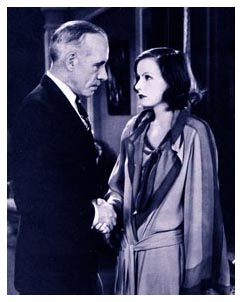 develop
the part, he steadfastly refused, explaining to Brown, "My
character is weak, and he's got to be handled that way. Footage
doesn't matter. I'd rather play the part of a butler in a good
picture than have every foot in a film that's a flop" (taken
from Dark Star by Leatrice Gilbert Fountain (St. Martin's
Press, 1985).
develop
the part, he steadfastly refused, explaining to Brown, "My
character is weak, and he's got to be handled that way. Footage
doesn't matter. I'd rather play the part of a butler in a good
picture than have every foot in a film that's a flop" (taken
from Dark Star by Leatrice Gilbert Fountain (St. Martin's
Press, 1985).
Clarence Brown, Garbo's favorite director, guided the cast well through this turgid material. Douglas Fairbanks Jr., in this offbeat role, is recklessly intense as the doomed Jeffrey, and his death scene is one of the most chilling in all of silent cinema. Film veteran Hobart Bosworth, the inadvertent villain, is wonderful: both his initial priggishness and his contrition, as he comes to understand Diana's worth, are totally believable. So is his authority: we immediately understood why Neville acts powerless before him. Dorothy Sebastian's Constance is sweet and understanding, although she doesn't have much to do except stay that way. Lewis Stone and Johnny Mack Brown are, well, lumps on the screen; but Stone's perpetual stolidity is right for the avuncular role he assumes here, and future cowboy star Brown at least shows Garbo the same crinkly-eyed affection that he would bestow on his horses a decade later. As noted earlier, Gilbert's role is weak, and the Variety review of January 23, 1929, commented that "whole groups of women customers audibly expressed their discontent with the procedings." But if his encounters with Garbo do not carry the primal charge of their earlier films, there is a more mellow glow that Corliss finds refreshing, "with the two stars for once radiating a domestic lovelight: the natural affection of longtime, loving friends instead of the passion of star-crossed lovers." Plus there's no denying the bottom line: Garbo never had another costar who looked so right with her.
So we are left with the legend herself. Those who think
her expressionless should see her reaction to David's suicide
-- horror has seldom been so directly conveyed. Those who think
Garbo devoid of humor except in Ninotchka (MGM, 1939) should
watch her playful "monkey-see-monkey-do" game along
with a teasing wink she uses to cheer up little brother 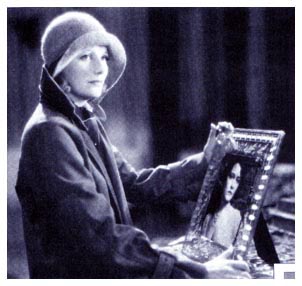 Jeffrey: this so-called sphinx makes one grin
like a kid. Perhaps the most absurd charge against Garbo has been
that her performances are cold. Nonsense. Watch her face when
she realizes that poor spineless Neville really does belong with
Constance, or when she looks at the doctor after learning that
this well-meaning but misguided friend has divulged her innermost
secret. Watch, most of all, the now-legendary set piece in which,
sharing the screen only with a vase of flowers, Garbo's Diana
sublimates the passion that she cannot express with Neville. What
Alistair Cooke was to term the "protective tenderness"
of Garbo's Anna Karenina (in the MGM film of 1935) is just as
true of her 1929 Diana Merrick. Garbo's scenes which hit home
with stabbing immediacy are never those infused with disdainful
grandeur; unfortunately, cocktail-party filmgoers (i.e., those
who haven't even seen the films but get by on hearsay) think this
is the only note that Garbo could play. Hardly. We're speaking
of an Academy Award-caliber performance here: Garbo expresses
love, tenderness, humility and compassion in A Woman of Affairs
in time-suspended moments that reveal the essence of both
this great actress and the medium that she graced at its twilight.
Jeffrey: this so-called sphinx makes one grin
like a kid. Perhaps the most absurd charge against Garbo has been
that her performances are cold. Nonsense. Watch her face when
she realizes that poor spineless Neville really does belong with
Constance, or when she looks at the doctor after learning that
this well-meaning but misguided friend has divulged her innermost
secret. Watch, most of all, the now-legendary set piece in which,
sharing the screen only with a vase of flowers, Garbo's Diana
sublimates the passion that she cannot express with Neville. What
Alistair Cooke was to term the "protective tenderness"
of Garbo's Anna Karenina (in the MGM film of 1935) is just as
true of her 1929 Diana Merrick. Garbo's scenes which hit home
with stabbing immediacy are never those infused with disdainful
grandeur; unfortunately, cocktail-party filmgoers (i.e., those
who haven't even seen the films but get by on hearsay) think this
is the only note that Garbo could play. Hardly. We're speaking
of an Academy Award-caliber performance here: Garbo expresses
love, tenderness, humility and compassion in A Woman of Affairs
in time-suspended moments that reveal the essence of both
this great actress and the medium that she graced at its twilight.
Since this film was aired as part of the Thames Silents series produced by Kevin Brownlow and David Gill, we're guaranteed a silvery, glistening print, in itself reason for celebration. (Hey, Warner Home Video: there'd be even more to celebrate if you'd put this gem on DVD!) William Daniels' photography here is just about the most beautiful he ever did, and his many extended close-ups of Garbo take your breath away. Watching Cedric Gibbons' lush decor is like sitting in the back seat of a 1929 Rolls-Royce and running your hand over the leather seats and burled walnut trim. And this video transfer is a feast for the ears as well: like the other Brownlow-Gill restorations, this film features a new score beautifully composed and conducted by Carl Davis. (It'd sound even more beautiful on DVD, Warner! You listening, Warner?)
Well, Doubting Thomas, do you doubt still? See it, do. You won't have profundity; but you'll have MGM in all its glamour during the last hurrah of the silents, and you'll have Garbo. Then you'll understand anew the concluding couplet of Emerson's "The Rhodora":
Copyright 2004 by Dean Thompson. All rights reserved.